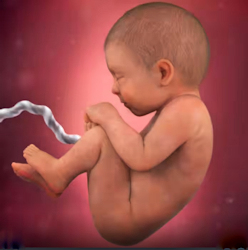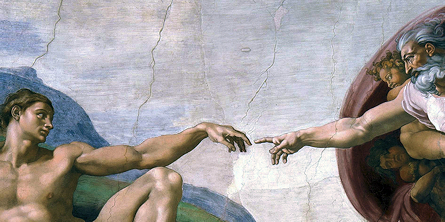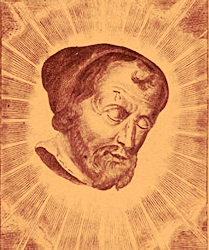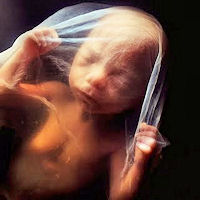Ordinary Time: January 22nd
Day of Prayer for the Legal Protection of Unborn Children
Other Commemorations: St. Vincent, Deacon and Martyr (RM); St. Anastasius, Martyr
» Enjoy our Liturgical Seasons series of e-books!
January 22 is the anniversary of Roe v. Wade and the day established by the Church of penance for abortion, has been formally named as the “Day of Prayer for the Legal Protection of Unborn Children.” On this day (or January 23rd when January 22nd falls on a Sunday) your parish, school or religious formation program may celebrate the Mass for Giving Thanks to God for the Gift of Human Life. This Mass, found in our newly-translated Missal, may now be used on occasions to celebrate the dignity of human life.
The relevant change reads: “The liturgical celebrations for this day may be the Mass “For Giving Thanks to God for the Gift of Human Life? (no. 48/1 of the Masses and Prayers for Various Needs and Occasions), celebrated with white vestments, or the Mass “For the Preservation of Peace and Justice? (no. 30 of the Masses and Prayers for Various Needs and Occasions), celebrated with violet vestments.”
In addition to this special Mass on this day, perhaps your parish, school or religious formation program could encourage traditional forms of penance, host pro-life and chastity speakers, lead informative projects that will directly build up the culture of life, show a pro-life film, raise funds for local crisis pregnancy centers or offer additional prayer services.
According to the 1962 Missal of St. John XXIII the Extraordinary Form of the Roman Rite, today is the feast of Sts. Vincent and Anastasius. During the early years of the fourth century, Vincent, a young deacon, was inhumanly tortured by Dacian, Roman governor of Valencia in Spain. Vincent rejoiced in his sufferings until he drew his last breath. More than three hundred years later, Anastasius the Persian, a convert from the priestly caste of Magi, endured a similar martyrdom in distant Assyria. Through all the Christian sacrifices to that of Calvary for the salvation of every man born into the world.
The Love of Life
 Love is not merely a feeling, but is rather the desire for the best possible good for those whom we love. Through our natural intelligence and through Divine Revelation we become aware of the value of this most basic of all gifts which is life. Mere reason leads us to comprehend that it is better to be alive than never have had been in existence. The knowledge of the value of life that comes through revelation leads us to understand better this gift and to appreciate it: as a result, we worship and love more and more the Giver of this gift. This love is what moves us to protect the life of the unborn or any who might be unjustly treated. We are also led to protect women that might feel tempted or forced to commit abortion, as we know the devastating consequences that abortion will have in their lives. Last but not least we have to love, even if most of them seem to be utterly unlovable, the many perpetrators of abortion: medical personnel, and pro-abortion activists and politicians. We have to do everything that we can to convince them of their errors so that they repent and change their ways, both for their own benefit and for the benefit of society.
Love is not merely a feeling, but is rather the desire for the best possible good for those whom we love. Through our natural intelligence and through Divine Revelation we become aware of the value of this most basic of all gifts which is life. Mere reason leads us to comprehend that it is better to be alive than never have had been in existence. The knowledge of the value of life that comes through revelation leads us to understand better this gift and to appreciate it: as a result, we worship and love more and more the Giver of this gift. This love is what moves us to protect the life of the unborn or any who might be unjustly treated. We are also led to protect women that might feel tempted or forced to commit abortion, as we know the devastating consequences that abortion will have in their lives. Last but not least we have to love, even if most of them seem to be utterly unlovable, the many perpetrators of abortion: medical personnel, and pro-abortion activists and politicians. We have to do everything that we can to convince them of their errors so that they repent and change their ways, both for their own benefit and for the benefit of society.
All human beings are created in the image and likeness of God. Using a traditional scholastic term, we can state that He is the exemplary cause of every human being, in other words, He is the model on which all human beings are created. He looked upon himself and wished that other beings would share in His own happiness. So if we reflect upon ourselves, we can begin to understand our participation in the greatness of our Creator. This participation on His greatness leads us to comprehend that He has brought us out of nothing with a purpose, because knowing His intelligence and His loving nature it is clear that all His actions are always guided by a magnificent purpose. The first intention for which He has created us is that we should enjoy for an eternity His loving company in Heaven. All human persons are called to this eternal and loving company, no one is excluded, save those who, through their own actions, exclude themselves.
 This manner of creation brings us to understand the unique essential dignity of every human being. A dignity that is not lost for any deprivation of the many external perfections that we might expect to find in a human person. A person might be born with a disability, or may suffer disability through injury or disease, but these deprivations do not affect his basic dignity. A Christian also has the hope that one day when the doors of Paradise will be opened for those children, all their human imperfections will be healed and they will enjoy forever the beatific vision that we all long for.
This manner of creation brings us to understand the unique essential dignity of every human being. A dignity that is not lost for any deprivation of the many external perfections that we might expect to find in a human person. A person might be born with a disability, or may suffer disability through injury or disease, but these deprivations do not affect his basic dignity. A Christian also has the hope that one day when the doors of Paradise will be opened for those children, all their human imperfections will be healed and they will enjoy forever the beatific vision that we all long for.
We are also created to be collaborators in the salvation of the World. The Lord normally does not intervene directly in the world; He does it through our free collaboration in his plans of salvation. He gives to us the saving truths through Holy Scripture, our natural reason and the mediation of the Church and we have to manifest them in our daily lives. If we love those truths we should be impelled to share them with all whom the Lord places in front of us. So when we speak with love and conviction of those truths we cannot be accused of carrying out an exaggerated rhetoric when we defend human life from its biological beginning until natural death. Nobody in his right mind can call it "vitriolic rhetoric" when we denounce that millions upon millions of unborn babies have been killed in the womb in the U.S. and in the rest of the world. It is literally a question of life and death, for the victim, for the mother of the baby and for the perpetrator of abortion, assisted suicide or euthanasia. The victim will have his earthly life terminated; the mother will suffer greatly for her actions, and the perpetrator and the mother will live under the shadow of the unhappiness of having rejected the loving truths of their Creator and certainly they will place their eternal salvation in jeopardy. Our main solidarity has to be always with the victim of the crime, because if the conscience of the nation is not moved by this growing injustice, we know that a growing number will be victimized in the future. Our solidarity is also with the mothers of those babies because often they have been misled or forced into committing this terrible action.
Last but not least we wish and pray that all abortionists will understand the terrible consequences of their actions and be converted.
--Excerpted from Spirit & Life, Monsignor Ignacio Barreiro-Carámbula, Interim President, Human Life International
St. Anastasius
 The older Roman Martyrology relates: At Bethsaloen in Assyria, St. Anastasius, a Persian monk, who after suffering much at Caesarea in Palestine from imprisonment, stripes, and fetters, had to bear many afflictions from Chosroes, king of Persia, who caused him to be beheaded. He had sent before him to martyrdom seventy of his companions, who were drowned in a river. His head was brought to Rome, at Aquæ Salviæ, together with his revered image, by the sight of which demons are expelled, and diseases cured, as is attested by the Acts of the second Council of Nicea. The saint was venerated highly in Rome.
The older Roman Martyrology relates: At Bethsaloen in Assyria, St. Anastasius, a Persian monk, who after suffering much at Caesarea in Palestine from imprisonment, stripes, and fetters, had to bear many afflictions from Chosroes, king of Persia, who caused him to be beheaded. He had sent before him to martyrdom seventy of his companions, who were drowned in a river. His head was brought to Rome, at Aquæ Salviæ, together with his revered image, by the sight of which demons are expelled, and diseases cured, as is attested by the Acts of the second Council of Nicea. The saint was venerated highly in Rome.
In the previous liturgical calendar, St. Vincent of Saragossa, deacon and martyr and St. Anastasius were paired together. St. Vincent is included in the Universal Calendar, but in the United States his feast is transferred to January 23.
Patronage: against headaches; goldsmiths
Highlights and Things to Do:
- Read more about St. Anastasius:
- See the church in Rome, Santi Vincenzo e Anastasio a Trevi dedicated to Sts. Vincent and Anastasius.
- See the statue of St. Anastasius at the St. Peter's Basilica Colonnade.






